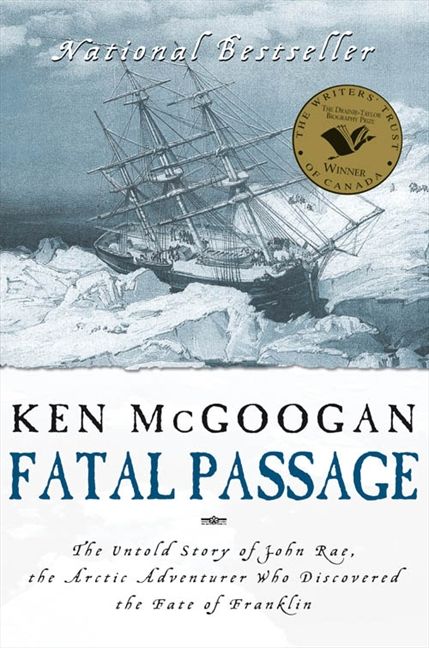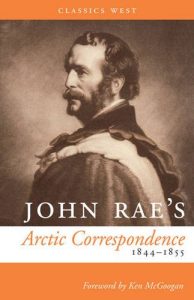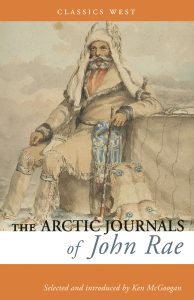Fatal Passage
 Buy the Book: Amazon, Apple Books, Barnes & Noble, Bookshop, Indigo
Buy the Book: Amazon, Apple Books, Barnes & Noble, Bookshop, IndigoTitle: Fatal Passage: The Untold Story of John Rae, the Arctic Adventurer Who Discovered the Fate of Franklin
Published by: HarperCollins Canada, Bantam/ Transworld/Bantam U.K., Carroll & Graf U.S.
Release Date: 2001
Overview
Fatal Passage tells the story of Dr. John Rae, an unsung Arctic fur-trader who solved the two great mysteries of nineteenth-century Arctic exploration. Rae discovered both the final link in the Northwest Passage and the fate of the lost expedition of Sir John Franklin, whose final survivors resorted to cannibalism. Because he revealed that truth to Victorian England, Rae was vilified and virtually erased from history.
A national bestseller, Fatal Passage won the Writers’ Trust of Canada Drainie-Taylor Biography Prize, the Canadian Authors’ Association Lela Common Award for Canadian History, the Grant MacEwan Author’s Award, and an American Christopher Award for a work of artistic excellence that “affirms the highest values of the human spirit.” Film-maker John Walker turned the book into an award-winning docudrama called Passage, which aired on BBC and History Channel.
Readers Respond
“. . . delightful reading.”
—Andrea Barrett
“. . . compulsively readable . . . ”
—Quill & Quire
“. . . one of the most important books written on Canadian history in recent years”
—Times Colonist (Victoria)
“In Fatal Passage, author Ken McGoogan takes on Canada's image of itself as he seeks to correct historical inaccuracies and expose the attitudes that created them. The story centres on the life of John Rae, a Hudson's Bay Co. doctor turned Arctic explorer. McGoogan clearly see his protagonist as a figure of heroic proportions who has been denied his rightful place in history, in part, because he found that Indigenous methods of coping in the bush were superior to methods used by Europeans.”
—Paul Barnsley, Aboriginal Multi-Media Society:
Q&A with January Magazine
Writer and editor Linda Richards did a superb job with this Q&A, which is why it still stands up. She published it in January Magazine . . . in April, 2002!
Linda Richards: I understand that you initially conceived Fatal Passage as a novel.
Ken McGoogan: I was going to write a novel. That was one of the interesting things about this, I was able to apply my background as a fiction writer to the factual material. I found that particular skill set very useful. And then combining it with the journalistic research skill set, which is different. But when I went to Cambridge ... I initially thought I was going to write a contemporary novel with a historical aspect. The historical aspect focusing on John Rae.
When were you at Cambridge?
That would have been 1998, for three months in the fall.
Is that when you discovered the story of John Rae?
Yes. What happened was, I found out -- after I realized I was going to try and write something about Rae -- that they housed his unpublished autobiography at Cambridge. There's a place called the Scott Polar Research Institute and they have this 821-page palimpsest -- handwritten -- that Rae put together and has never been published. In addition to all kinds of correspondence. And then there's an extraordinary library at Cambridge in and of itself because it's one of two or three holding libraries in the UK. Theoretically, at least, every book published in the UK has a home at Cambridge. So I had access to extraordinary resources there.
As I researched John Rae and his story I realized: Hey, wait a minute. This is far more important than I realized and if I write it as a novel, people will be able to dismiss it. They'll say: Aw, McGoogan, he's just making it up, we don't have to take it seriously. I set aside the novel project to tell the true story: to set the record straight.
See also The Arctic Journals of John Rae and John Rae's Arctic Correspondence, which Ken introduces

